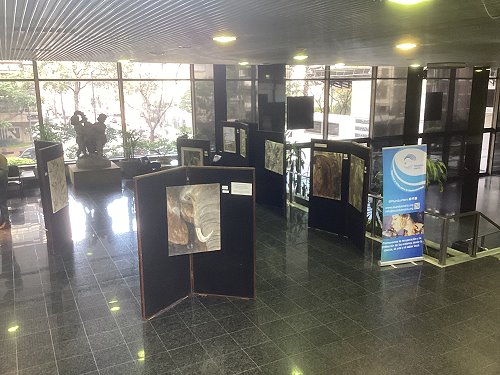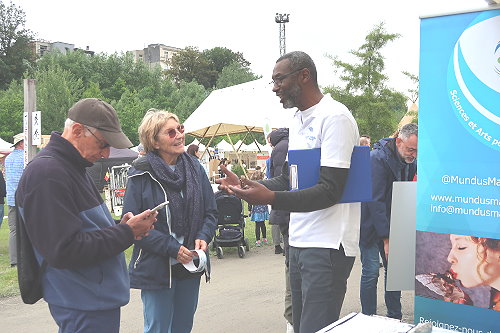 This year again, the environment festival in Brussels offered a good opportunity to carry the message of World Ocean Day. On 2 June 2024, in the spacious Tour & Taxis park in Brussels, in what was once the largest railway station for goods in Europe, families and visitors from the vicinity in Schaerbeek and whereabouts flocked to the activity tents and food stalls, never in risk of overcrowding. Mundus maris welcomed visitors in Tent no.17 throughout the day.
This year again, the environment festival in Brussels offered a good opportunity to carry the message of World Ocean Day. On 2 June 2024, in the spacious Tour & Taxis park in Brussels, in what was once the largest railway station for goods in Europe, families and visitors from the vicinity in Schaerbeek and whereabouts flocked to the activity tents and food stalls, never in risk of overcrowding. Mundus maris welcomed visitors in Tent no.17 throughout the day.
The core message to the many visitors at our tent was about appreciating the importance of the ocean for our lives, even if we do not live on the coast. As ocean literacy is not a significant topic in ordinary curricula in Belgium - or in Europe for that matter - celebration of the day is all the more important to start filling the gap. Indeed, visitors stopped happily to explore our demonstration of ocean acidification on the calcareous shells of molluscs, corals and other ocean dwellers and engage in discussions about how to collaborate to protect the ocean and ourselves more effectively. The conversations led to a number of new subscribers to our monthly newsletter and suggestions for collaboration after the event.
And, of course, at a festival, never to neglect the playfulness of testing one's ocean knowledge with the well-tested Ocean Game or exploring the minimum reproductive size of fish with the fish ruler and the FishBase Guide app. The weather remained stable throughout the day, in the afternoon the sun made a showing thus adding to the relaxed and pleasant atmosphere. The map of the event space is here and the pictures below capture moments of visitor interaction throughout the day. All pictures of Mundus maris asbl.
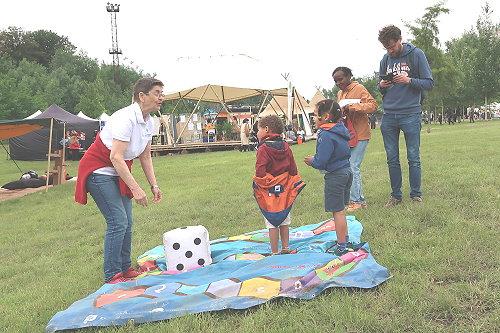 |
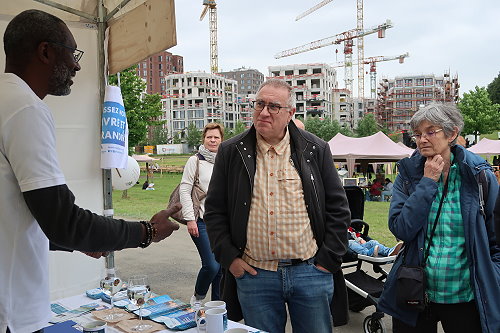 |
| Fun with the Ocean Game | The founder of the HOME event was interested in our messages |
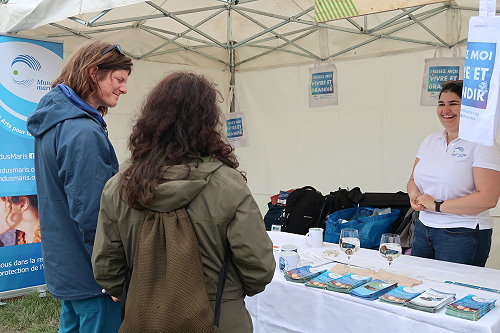 |
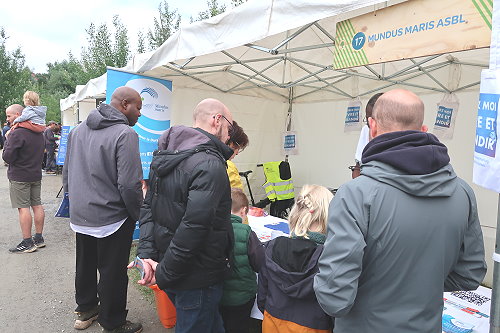 |
| Ocean acidification shown in a glass | Lots to discover at the Mundus maris tent |
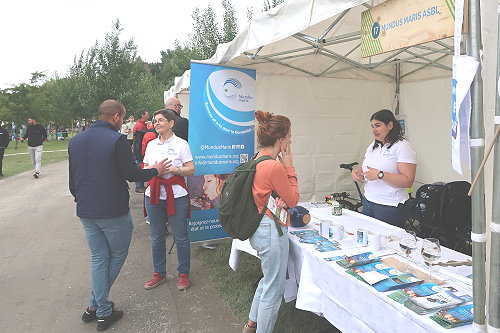 |
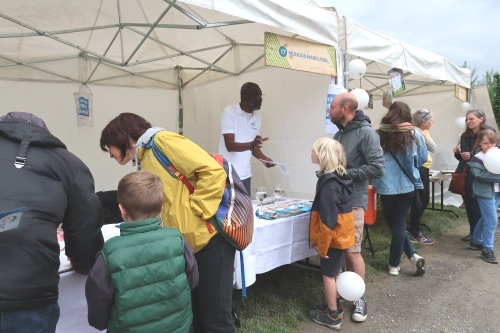 |
| Good conversations throughout the day | Signing up for the Mundus maris newsletter |
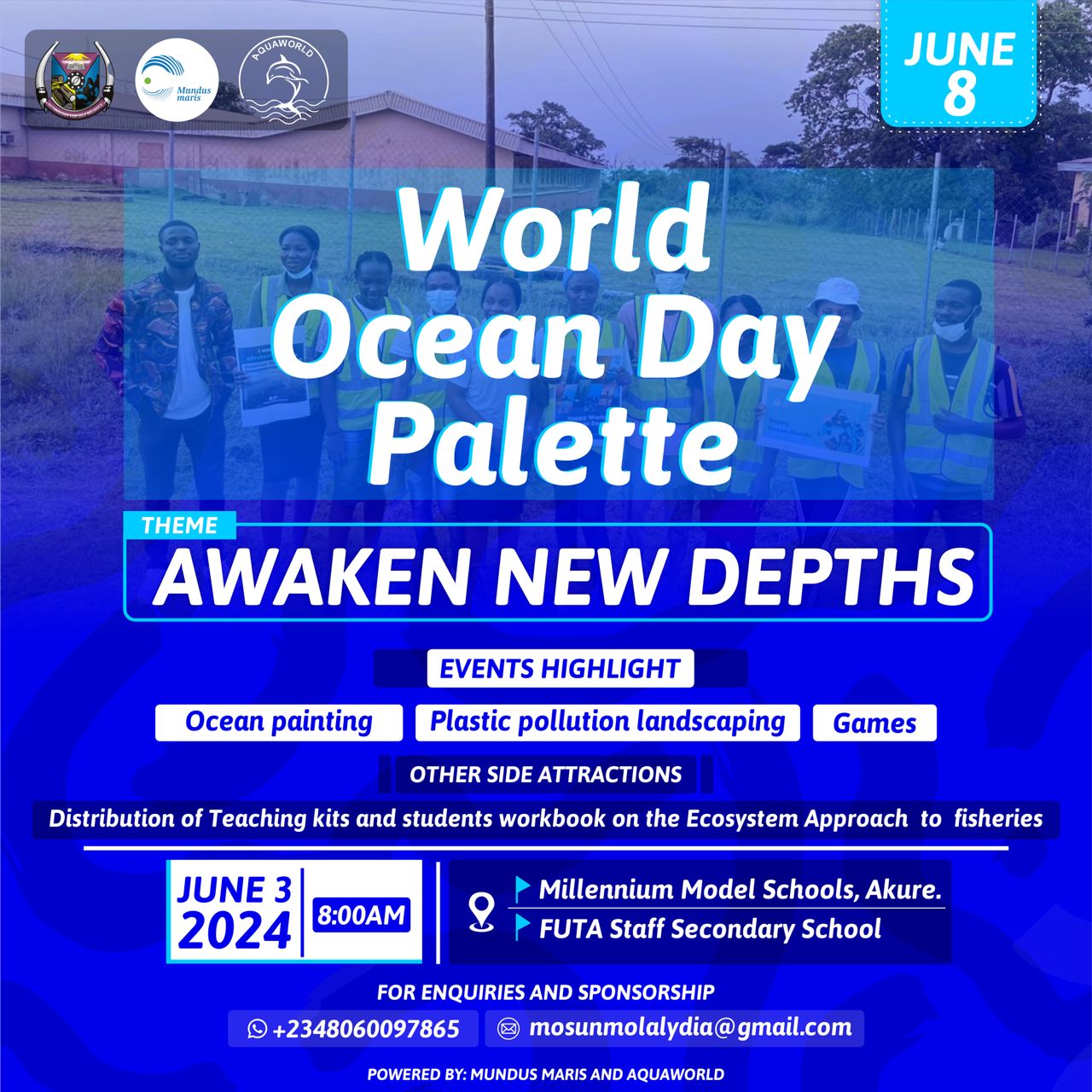 Awaken New Depths, celebrating in Akure, Ondo State, Nigeria
Awaken New Depths, celebrating in Akure, Ondo State, Nigeria
Activities started already on 3 June, 2024 and extended to 8 June, World Ocean Day itself, all inspired by this year's UN motto.
To commemorate this year's World Ocean Day, Mundus maris asbl, in collaboration with Aquaworld, hosted a significant event in Akure, Ondo State, Nigeria. The event was notable for the participation of The Millennium Group of Schools in Akure for the first time, adding to the grandeur of the occasion. The theme for this year's event was "Awaken the New Depth," aimed at raising awareness about global issues impacting our ocean and ourselves.
As the UN was saying: "We don't have time for "out of sight out of mind." If the world is numb to numbers, motivating momentum will require opening minds, igniting senses, and inspiring possibilities to protect our planet’s beating heart. We need to awaken new depths within our own."
The day's program on 3 June featured educational lectures, an ocean-themed quiz, and artistic activities including 'The World Ocean Palette,' which involved drawing and painting. These activities were designed to enlighten participants about the impact of human activities on the ocean and to showcase the ocean's aesthetic beauty.
Dr. Adeleke Mosunmola Lydia from the Federal University of Technology, Akure (FUTA), representing Mundus maris asbl in Nigeria, led volunteers, guests, and students to a site known for plastic pollution. This activity emphasized the importance of ocean conservation efforts, focusing on plastic upscaling.
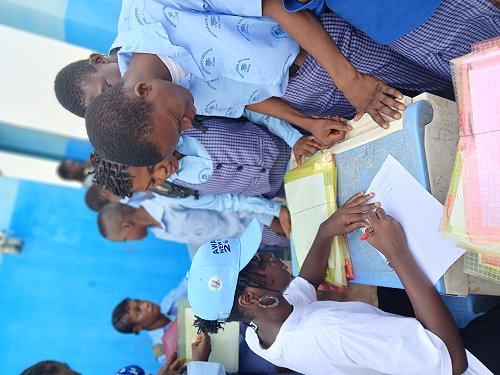 |
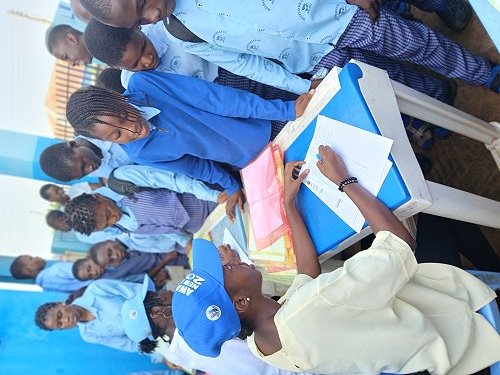 |
The program began at 9:10 am with registration, followed by an introduction by Mr. Oluwatobi from Aquaworld, highlighting the significance of the event. Discussions on plastic pollution and the 4'R approach (Refuse, Reduce, Reuse, and Recycle) were conducted, encouraging participants to advocate for ocean well-being.
The official start of the event at 10:00 am included an opening prayer and the introduction of guests by Dr. Lydia Adeleke, who spoke about the mission and vision of Mundus maris asbl. She highlighted the commitment and contributions of the organization's President, Dr. Cornelia E Nauen, and Vice President, Prof. Stella Williams, and encouraged students to become agents of change. Prof. O.A. Fagbenro (FUTA) also extended his goodwill message.
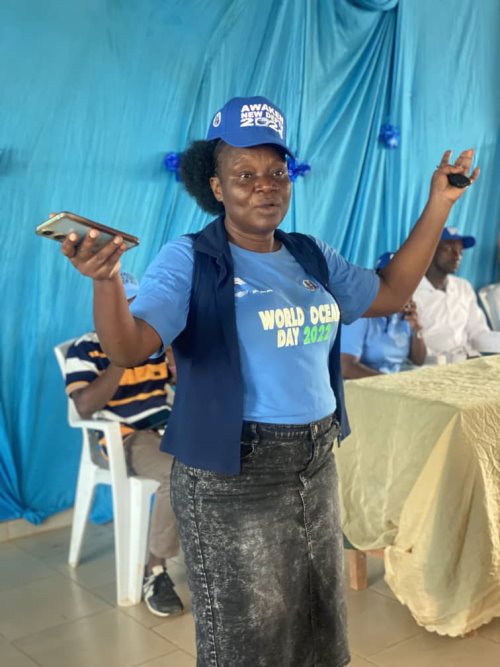 |
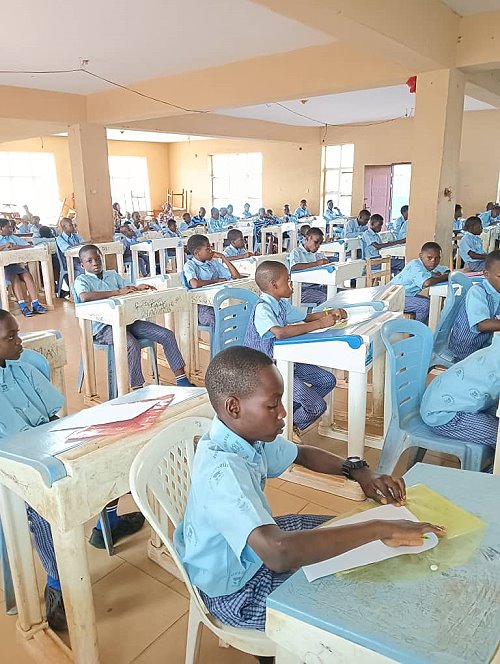 |
| Dr. Lydia Adeleke | During the ocean drawing exercise |
Mr. Paul Eweola, founder of Aquaworld, represented by Mr. Oluwatobi Aladekoye, emphasized the importance of ocean conservation, and shared his organization's ongoing efforts to combat marine pollution. Prof. I. A. Ajibefun (Founder: Millennium Group of Schools, Akure) in his speech urged students and participants to learn and act to protect the ocean.
The first lecture, titled "Awaken New Depth," was delivered by Dr. Israel Oke from the Department of Fisheries and Aquaculture Technology, FUTA. He discussed the ocean's uniqueness and its benefits to humanity. The second lecture, "All About the Ocean," by Mr. Oladele Timothy T. from the same Department, focused on the ocean's attributes and its vital role in serving mankind.
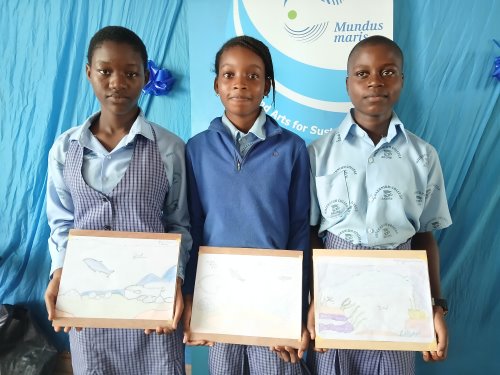 Following the lectures, students engaged in various activities based on their interests and class levels, including drawing, painting, and an ocean-themed quiz, providing an interactive and educational experience. Judges Dr. Wole-Alo (FUTA) and Mr. Ajakaye (Staff Secondary School, FUTA) selected winners for the drawing, painting, and quiz competitions, who were then awarded prizes.
Following the lectures, students engaged in various activities based on their interests and class levels, including drawing, painting, and an ocean-themed quiz, providing an interactive and educational experience. Judges Dr. Wole-Alo (FUTA) and Mr. Ajakaye (Staff Secondary School, FUTA) selected winners for the drawing, painting, and quiz competitions, who were then awarded prizes.
Mundus maris asbl also handed over their Teaching and Pupils Workbook Kits on the Ecosystem Approach to Fisheries to selected schools, including Staff Secondary School, FUTA; Millennium Group of Schools in Akure; and Higher Heights International Group of Schools. A total of 90 Pupils Workbooks and 3 Teaching Manuals were presented by Dr. Lydia.
Registered participants: 100 students, but attendance reached up to 150!
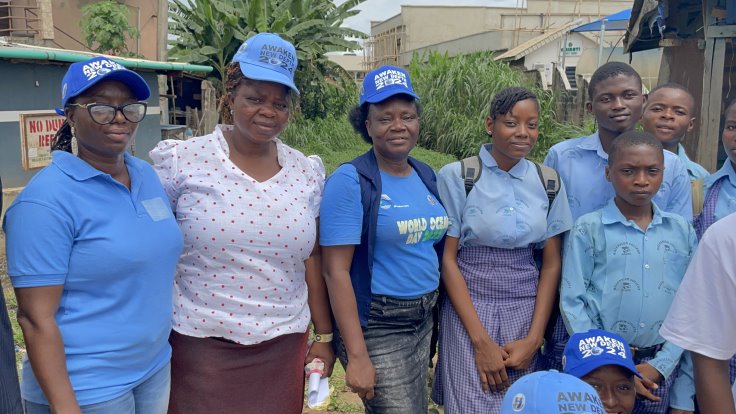
After the indoor session, participants visited a site near FUTA South Gate known for its plastic pollution, where they discussed practical solutions to mitigate environmental impacts. This site visit highlighted the reduction in plastic pollution due to awareness efforts by Mundus maris and Aquaworld.
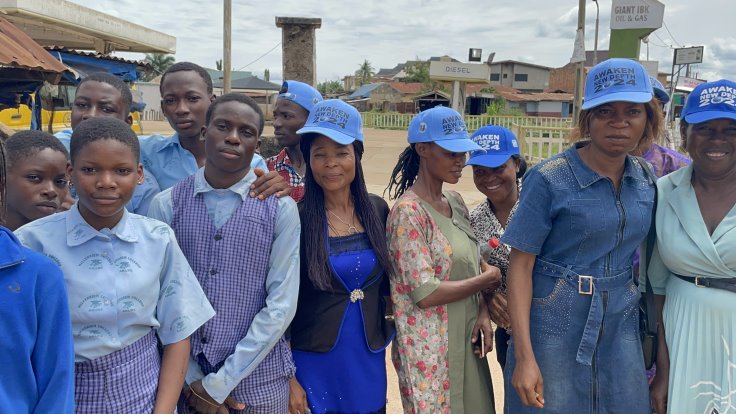
The event concluded with a closing address by Dr. Lydia, who expressed gratitude to all supporters and participants, encouraging them to continue advocating for ocean conservation. The program ended with a group photo at the site, marking the conclusion of the 2024 Mundus maris World Ocean Day celebration in Akure, shortly after 1 pm.
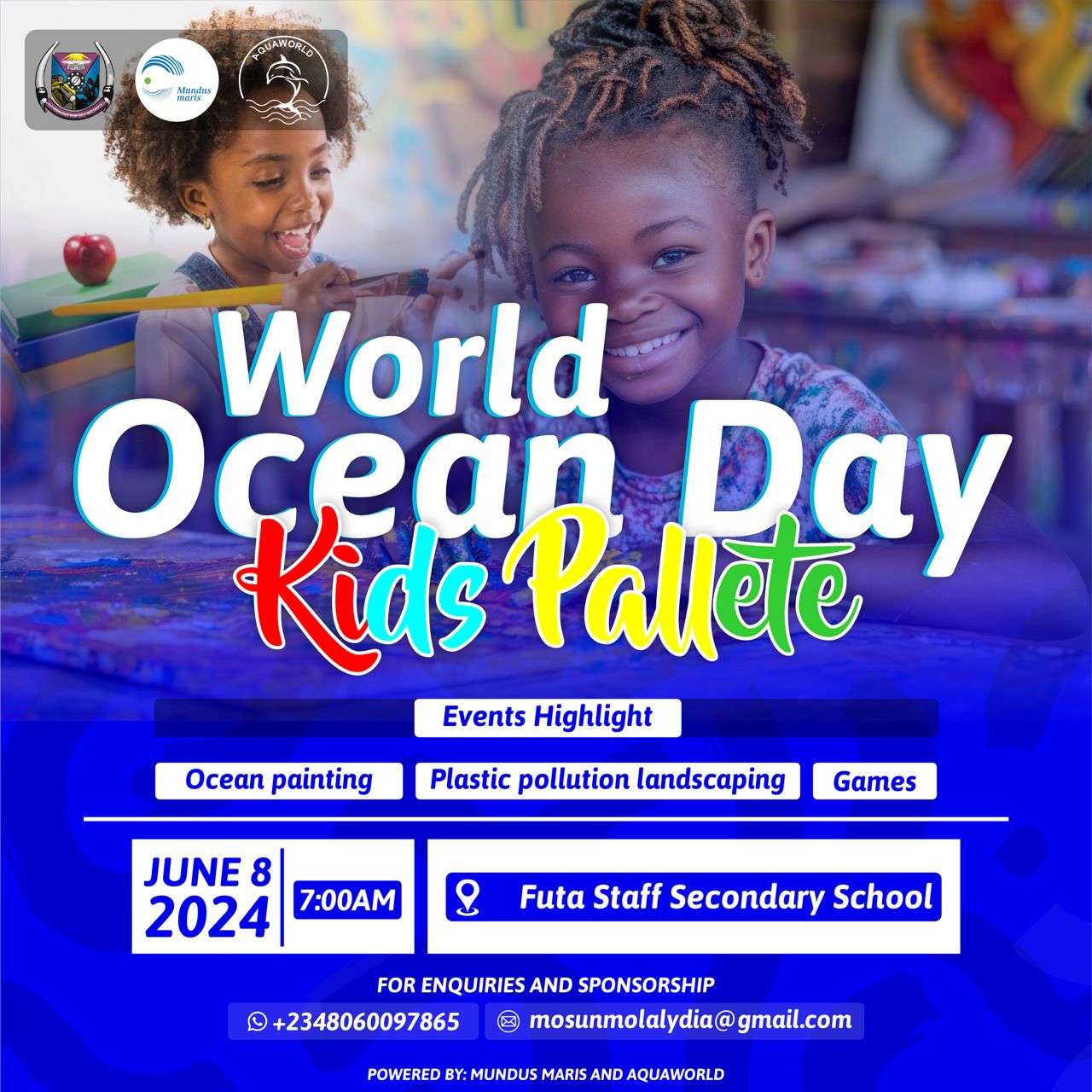
Happy World Ocean Day 2024!
Celebrating World Ocean Day in Buenos Aires, Argentina
During the World Ocean Day 2024 event at the University of Belgrano, Buenos Aires, Argentina, on 6 June 2024 several noteworthy presentations and activities took place. Dr. AyoJesutomi Abiodun-Solanke from the Federal College of Fisheries and Marine Technology in Lagos, Nigeria, presented her research on the use of natural preservatives derived from underutilized plant materials to preserve fish in Nigeria. Her study focuses on the effectiveness and safety of these natural preservatives, improving storage quality and reducing dependency on synthetic preservatives. She also highlighted how these practices contribute to ocean sustainability, reducing pollution and supporting artisanal fishing communities.
Engineer Gustavo Aldegani, a researcher at the University of Belgrano, discussed the relationship between carbon footprint and computing, including artificial intelligence. He highlighted how these current resources contribute to CO2 emissions, exacerbating global warming and ocean pollution. He proposed strategies to mitigate this impact, including energy efficiency, the adoption of renewable energies, the circular economy, and carbon footprint compensation, emphasizing the importance of these measures to protect both people and the environment.
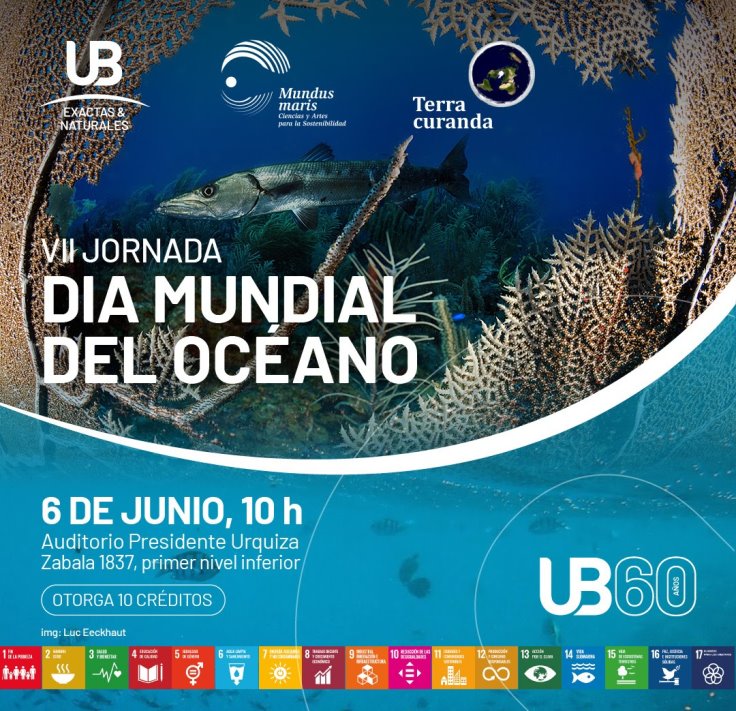
Dr. Patricia Morales, a professor at the University of Leuven in Belgium and Vice President of Mundus maris, emphasized the importance of integrating human rights into ocean protection, using the 2030 Agenda and its 17 Sustainable Development Goals as a framework. She underlined how the ocean is crucial for poverty reduction, food security, human health, gender equality, and environmental sustainability. She concluded that international cooperation and the explicit inclusion of human rights are essential for the success of the UN Decade of Ocean Science.
Ms. Awa Djigal, an artisanal fish processor in Senegal and Secretary of the Network of Women in Artisanal Fisheries in Senegal (REFEPAS), highlighted the importance of women in the post-harvest value chain in fisheries. She pointed out the challenges they face, such as insufficient recognition and difficulties in accessing resources and financing. She proposed solutions such as strengthening agroecological diversification and improving governance. Awa concluded with a call to protect the ocean, a source of life, both individually and collectively.
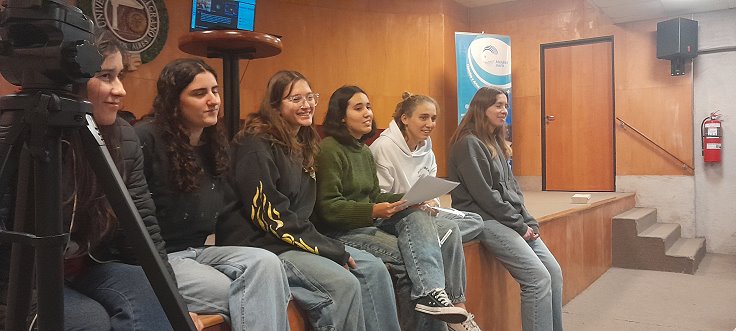
The conference-style presentations were followed by a role-playing game with biology students. It was developed by Mundus maris and adapted at the University of Belgrano for the context of the event in Argentina. The aim is to engage young adults in searching to understand challenges and finding solutions for the sustainable management of marine resources. One key element is the creation of a marine protected area (MPA) as mandated by the Global Biodiversity Framework (GBF) agreed internationally in December 2022 in order to stop mass species extinctions, particularly in the sea.
The original of the role play had been tested with almost all 11 proposed characters representing parties affected by the establishment of a new marine protected area in order to contribute to the implementation of the GBF. The challenge was to make the protected area work in the face of at least partially conflicting interests. In the configuration for the World Ocean Day event, junior (3rd year) biology students led the interpreted roles with the participation of sophomores (2nd year) and freshmen (1st year) students. They were divided into six groups, each tasked with adopting the role of one of the stakeholder groups considered essential for making an MPA work. These groups constituted representatives of a public authority, natural scientists, artisanal fishers, industrial fishers, wind farm owners, and nature conservation NGOs. Each group was first shown an explanatory video produced with AI based on a short introductory text about their character, and provided with printed materials to delve deeper into their respective roles. They then had 20 minutes to develop the arguments of their stakeholder group before engaging in an exchange with other stakeholders or rights holders. Marcelo Morales Yokobori, as moderator, supported by senior biology students, then initiated the overall exchange. Although the discussion was not arranged as an open circle conversation, where participants sit in a circle to encourage equal participation, it began with presentations of the arguments developed within each 'in-group' and evolved into a dynamic discussion that also included direct exchanges between stakeholder roles.
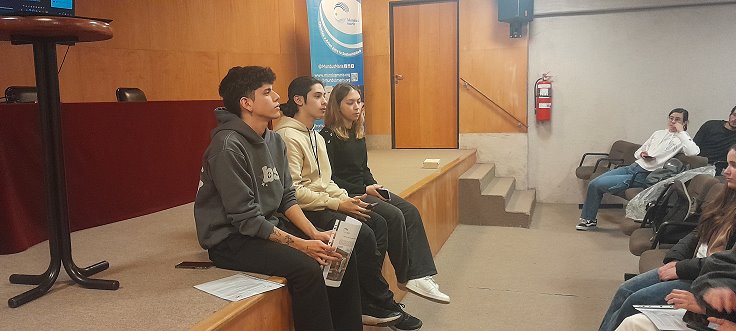
In the context of this role play enacted during the event, the government representatives proposed strict regulations and the creation of an offshore wind farm, industrial fishers requested support for sustainable methods, and NGOs and biologists recommended the creation of marine protected areas and sustainable fishing practices. Artisanal fishers expressed concerns about industrial fishing and suggested promoting tourism and sustainable practices. The activity concluded by emphasizing the need for collaboration among all actors to achieve the effective protection of marine biodiversity with healthy and productive ecosystems. The summary of results is available here.
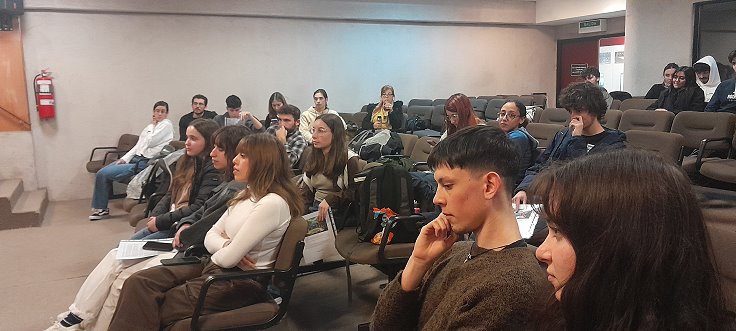
While not confronting the other stakeholders in direct exchange the in-group discussions still rose a lot of emotions as students tried to slip into the shoes of their characters and got heated up in the effort to marshal the best arguments. While the time was too short to enable a critical debriefing it is still believed to have generated some learning process beyond assimilating some facts. The entire exercise was certain even interesting for online event participants, some of whom enquired afterwards about the possibility to use the role play in the effort to engage with stakeholders for a concrete MPA establishment elsewhere.
Mundus maris is happy to stimulate creative adaptations of the role play to local conditions so long as the principal objective of effective biodiversity and ocean protection remains at the centre of the application.
World Ocean Day concert in Alcalá de Henares, Spain
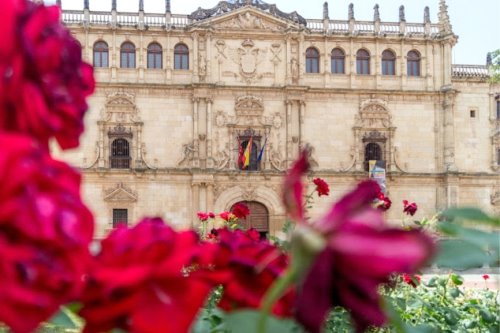 Alcalá de Henares, birthplace of Miguel de Cervantes and 30 km from Madrid, has its origins in the Roman city of COMPLUTUM. Today the city has 200,000 inhabitants. Its famous university was founded in 1499 and made Alcalá an important academic centre of the Spanish Golden Age. The great success of the new university model attracted the most important intellectuals of the 16th and 17th centuries. Among them were Antonio de Nebrija, Sto Tomás de Villanueva, San Ignacio de Loyola, Ambrosio de Morales, Federico Vallés de Covarrubias and many more.
Alcalá de Henares, birthplace of Miguel de Cervantes and 30 km from Madrid, has its origins in the Roman city of COMPLUTUM. Today the city has 200,000 inhabitants. Its famous university was founded in 1499 and made Alcalá an important academic centre of the Spanish Golden Age. The great success of the new university model attracted the most important intellectuals of the 16th and 17th centuries. Among them were Antonio de Nebrija, Sto Tomás de Villanueva, San Ignacio de Loyola, Ambrosio de Morales, Federico Vallés de Covarrubias and many more.
The impressive façade of the university, the Plateresque-style Colegio Mayor de San Ildefonso, is located in a unique historical setting. Alcalá was declared a UNESCO World Heritage Site in 1998.
There, in the beautiful music hall of the university, Mundus maris had the privilege of inviting the public to celebrate World Oceans Day on 8 June 2024. The programme focused on a musical journey through the centuries around the theme of "water", starting with G.F. Handel's "Water Music" (18th century) and ending with the hymn "Blue Wonderland", composed especially for this day. See the programme here.
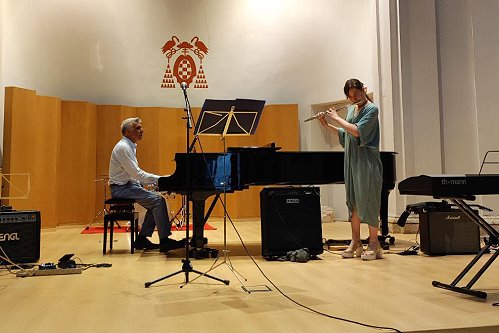 The skies seemed to bless this musical performance with plenty of rain, always welcome in the arid areas of central Spain.
The skies seemed to bless this musical performance with plenty of rain, always welcome in the arid areas of central Spain.
The impressive room had a packed audience when the event began at 7:30pm with the welcome address by a representative of the University. Patricia Morales (Mundus maris) thanked for the hospitality and highlighted the problems we are currently facing, both ecological and ethical. Next, Marianne Braun (Mundus maris) spoke about the importance of the ocean for humanity. She mentioned the urgent need to protect the 'blue marble' citing an encouraging example of what citizen engagement can achieve to give something back to the ocean (remarks attached here).
Then the musicians took the audience onto a beautiful musical journey, starting with Olegario Olayo Martínez on the piano, accompanying Almudena Olayo Martínez, soprano. At the end of this cycle, Olegario and Anastasia Petrushevska offered an instrumental version of "The Trout" by F. Schubert with Olegario, piano, and Anastasia, flute.
In the second part of the concert, the group Sun Day City played four pieces composed by Anastasia Petrushevska in a completely different, contemporary style. Anastasia doubled together with her sister Cristina Petrushevska as the group's singer. In turn, Cristina curated the visual framing of the concert.
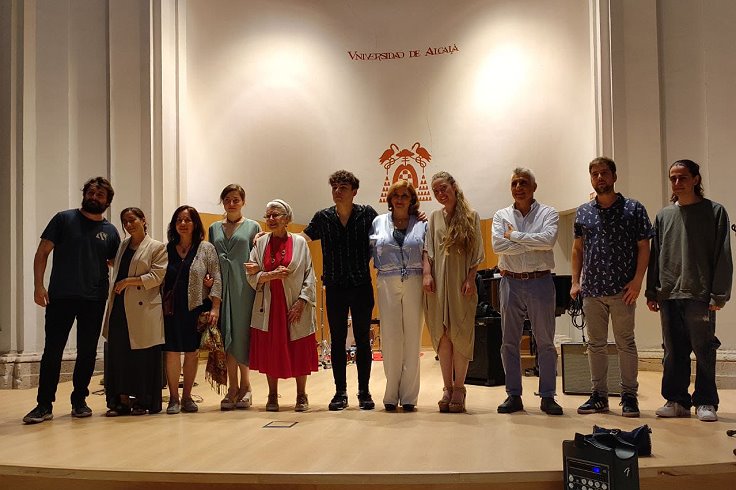
It was a lovely event that combined the serious global challenges of marine conservation with the all-encompassing language of music. The wonderful historical space, the music from different eras, the audience who completely filled the room, the information about Mundus maris distributed by young helpers at the exit, all this made for an unforgettable evening that, of course, ended with some summer red wine and some tapas.
Mundus maris is most grateful to the University and its team for enabling and supporting the concert with their great efforts and dedication.
Marianne Braun Richter
Mundus maris celebrates World Ocean Day 2024 with Ocean Summit in Kiel, Germany
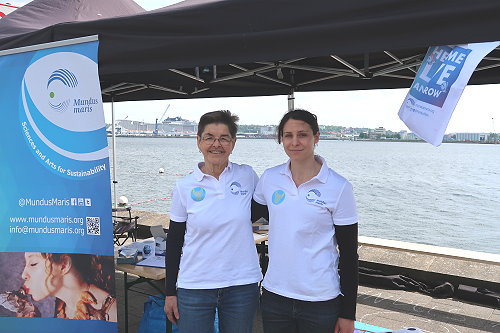 Kiel, the capital city of Schleswig Holstein, Germany, works hard to become a leading city for ocean protection on the Baltic Sea. For several years already Mundus maris has collaborated with many others around the 'Ocean Summit' core team to encourage marine protection in all its facets, with a particular emphasis on rehabilitating the badly sick Baltic. The ills go from overfishing provoking serious threats of species extinctions or at least excirpations, pollution from heavy agricultural run-off and poisonous weapons sunk after WWII to heavy impact of rapidly warming waters of this shallow sea basin.
Kiel, the capital city of Schleswig Holstein, Germany, works hard to become a leading city for ocean protection on the Baltic Sea. For several years already Mundus maris has collaborated with many others around the 'Ocean Summit' core team to encourage marine protection in all its facets, with a particular emphasis on rehabilitating the badly sick Baltic. The ills go from overfishing provoking serious threats of species extinctions or at least excirpations, pollution from heavy agricultural run-off and poisonous weapons sunk after WWII to heavy impact of rapidly warming waters of this shallow sea basin.
The sciences, including citizen science, the arts, education, all forms of constructive participation of concerned citizens, government policy and private sector engagement provide a promising mix for developing a broader-based consensus about going from diagnosis to the rehabilitation of the patient.
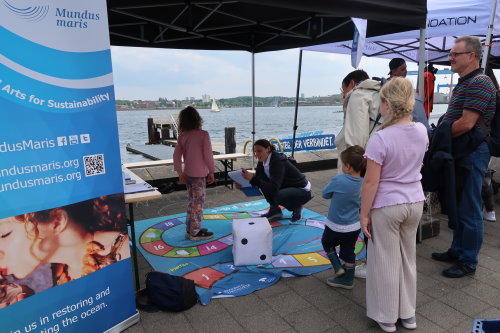 On World Ocean Day, 8 June 2024, visitors could test their knowledge playing the Ocean Game. What did their know about its importance for wonderful marine life, for stabilising the climate and more, and what to do to treat the ocean as a beloved friend.
On World Ocean Day, 8 June 2024, visitors could test their knowledge playing the Ocean Game. What did their know about its importance for wonderful marine life, for stabilising the climate and more, and what to do to treat the ocean as a beloved friend.
That was popular not only with the kids though Gianna was pleased to experience the good level of knowledge of most kids and the friendly support of their elders. During the exchanges a good number of measures cropped up people were already taking so as to reduce their carbon footprint or take care of reducing garbage and waste.
So, unsurprisingly, also the FishBase Guide app was again well received as a means to make more science based purchasing decisions or pay greater attention during angling tours.

The fish rulers about minimum reproductive lengths of major commercial fish species in the Baltic and North Sea went like hot dogs.
Following the official opening of the event on stage for marking the Day of the City Protecting the Sea (Tag der Meeresschutzstadt, for short TDM) all partners of the Ocean Summit were summoned to present their activities and to attract attention to their booths and public offers for the day.
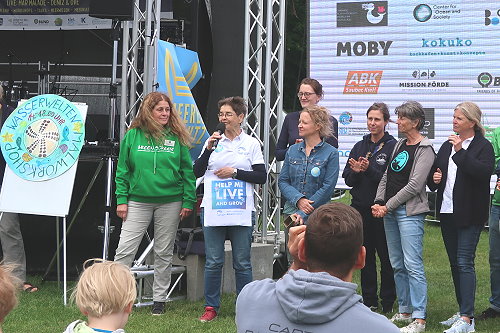 Cornelia Nauen spoke for Mundus maris highlighting the importance of connecting the global biodiversity and climate agreements to the context in the Baltic and to what each and everybody can do to make us all fit for the future. This was not the place for gloom and doom but rather for teaming up with determination to restore the crashed populations of cod and herring in the Western Baltic and with them other threatened marine life. The combination of serious concerns with lighter festive activities was a good way to charge the batteries for more concrete measures.
Cornelia Nauen spoke for Mundus maris highlighting the importance of connecting the global biodiversity and climate agreements to the context in the Baltic and to what each and everybody can do to make us all fit for the future. This was not the place for gloom and doom but rather for teaming up with determination to restore the crashed populations of cod and herring in the Western Baltic and with them other threatened marine life. The combination of serious concerns with lighter festive activities was a good way to charge the batteries for more concrete measures.
So the hours flew by in this energising and friendly atmosphere. Between 1600 and 2000 visitors were counted per hour during the events, twice as many as on an ordinary Saturday. Media coverage before and after was also encouraging.
Shortly before the planned closure a gush of rain made all visitors run for shelter. In combination with the upturning wind the booths all closed down a little earlier. Luckily the rain stopped and the public flocked back to the stage where the evening concert heated up bodies and minds. In short, a great World Ocean Day in Kiel with fabulous responses from the public and a great success for all contributors to the Ocean Summit team, including Mundus maris!
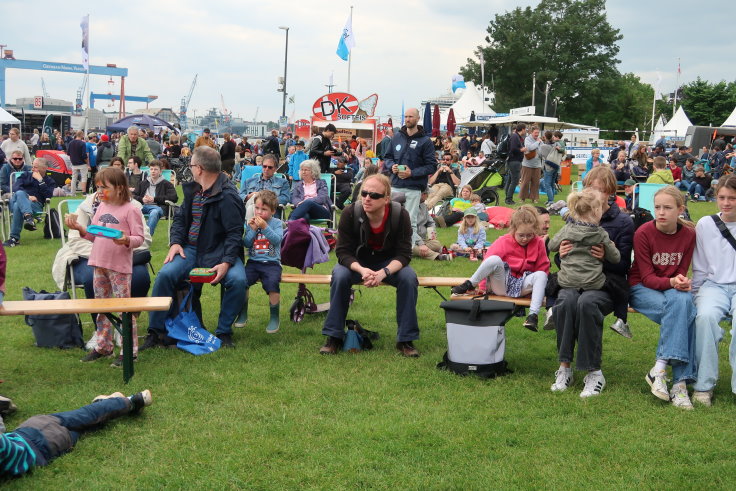
The programme flyer is available here.
Role Play in Cameroon
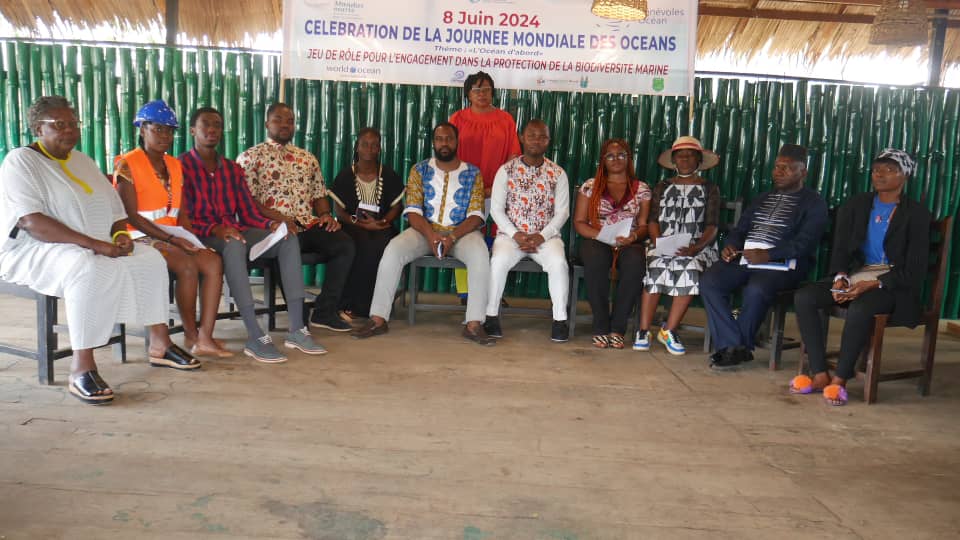
Exhibition "Rhythms of Nature" in Buenos Aires adds artistic flavour to World Ocean week
Mundus maris proudly sponsored the exhibition "Rhythms of Nature" by Laura Bustamante, curated by Maite Paladini in the spacious atrium of the Universidad de Belgrano in Buenos Aires, Argentina. The inauguration took place on 10 June 2024.
This exhibition highlights the vital relationship between the sciences and visual arts in promoting environmental awareness and action. By integrating artistic expression with scientific concepts, "Rhythms of Nature" aimed to make complex ecological issues more accessible and engaging for the public, fostering a deeper connection to and appreciation for both marine and terrestrial nature.
The exhibition space is well positioned for students and staff moving about between lectures and seminars.
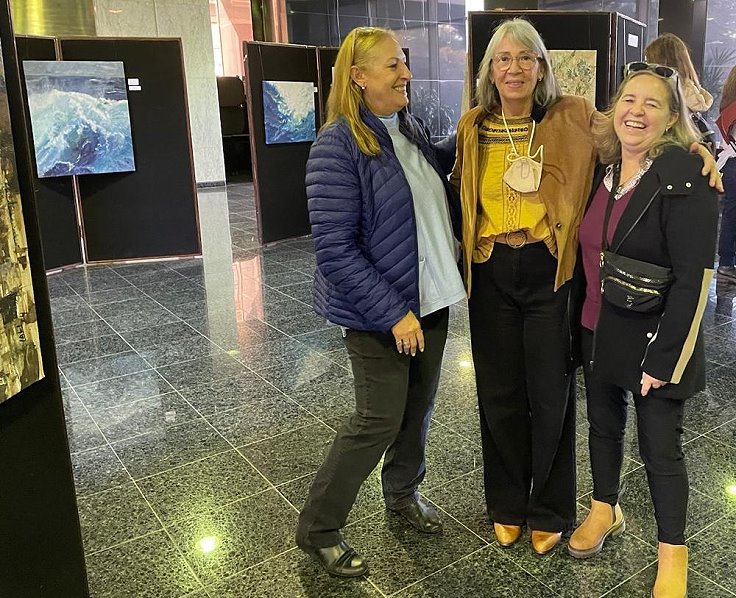
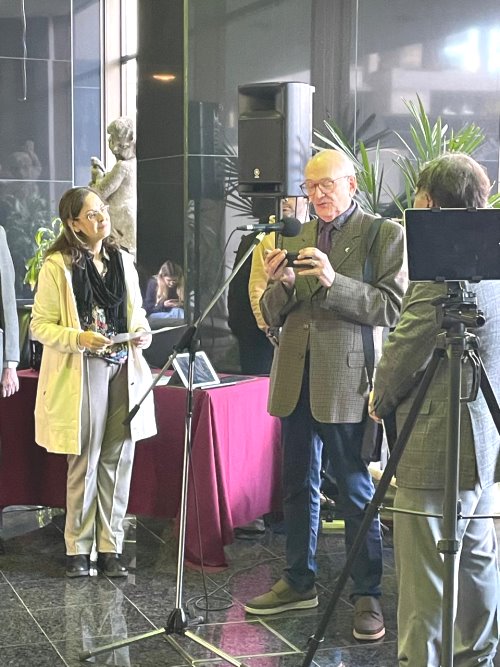 Additionally, Mundus maris was very pleased to recognize Dr. Obdulio Menghi for his exceptional contributions to global conservation as a biologist, former Scientific Coordinator and Head of the Scientific Unit of the Secretariat of the Convention on International Trade in Endangered Species of Wild Fauna and Flora (CITES), and founder and president between 1999 and 2019 of the independent Fundación Biodiversidad Argentina.
Additionally, Mundus maris was very pleased to recognize Dr. Obdulio Menghi for his exceptional contributions to global conservation as a biologist, former Scientific Coordinator and Head of the Scientific Unit of the Secretariat of the Convention on International Trade in Endangered Species of Wild Fauna and Flora (CITES), and founder and president between 1999 and 2019 of the independent Fundación Biodiversidad Argentina.
His unique ability to combine scientific insight with a deep appreciation for visual arts has significantly advanced environmental consciousness and advocacy, embodying the interdisciplinary spirit that Mundus maris champions.
View onto the exhibition hall above (Photo courtesy Marcelo L. Morales Yokobori).
Cleaning up around a creek in Hilden, Germany, again
It's becoming a tradition to clean up around the Hoxbach in Hilden, Germany, a tributary of the River Rhine. On Saturday, 15 June for World Ocean Weak, a small group of inveterate ocean lovers invited by Mundus maris gathered in two groups to mob up cigarette butts, plastic and other garbage from the vicinity of the creek. As the saying goes, ocean protection starts at home.
Equipped with gloves, pincers and bags from the municipal garbage management agency and a shot of good will and determination, the teams set off shortly after 2 pm.
The good news: compared to previous years the teams found a lot less of the toxic cigarette butts. Coincidence or did previous information campaigns, including by local newspapers, and clean ups bear fruit? We would certainly like to believe to witness the beginning of some behavioural change.
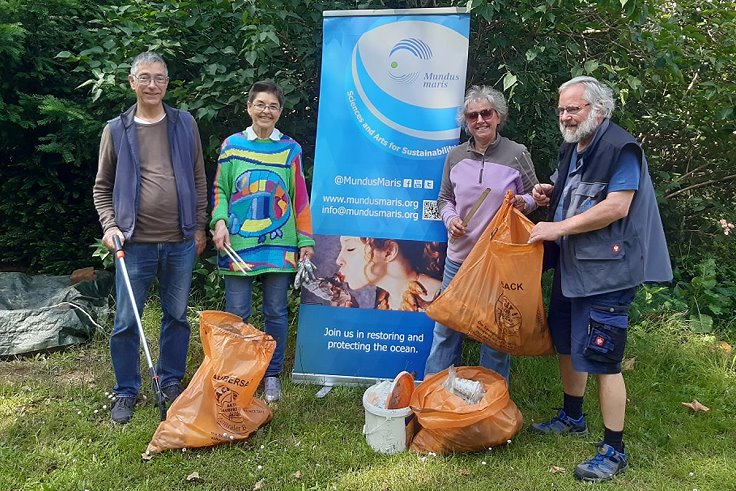
Gathering again after about one and a half hours, the harvest was still some 11 kg of trash, numerically mostly diverse plastic wrappings, but also a few bottles, coke cups and even dypers. It was a good feeling to know all this could be properly disposed off. After this joint effort the team enjoyed well-deserved relaxation on the garden with coffee and home-made cake. A pleasant way to celebrate World Ocean week.









